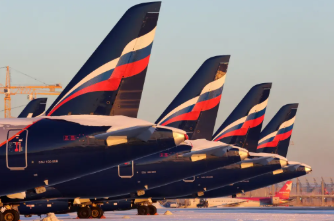Aviation Trade Loophole: Western Parts Reaching Russia
Since February 2022, Western nations, including the United Kingdom, the European Union, and the United States, have imposed strict sanctions on Russia, aiming to restrict its access to essential goods, including aviation components. These sanctions were introduced to weaken Russia’s ability to maintain and expand its fleet of aircraft, particularly in light of its geopolitical activities.
The sanctions explicitly prohibit the direct sale of aircraft parts and related equipment to Russian airlines and other organizations. Companies involved in aviation manufacturing were required to ensure that their products did not reach Russian soil, either directly or indirectly.
Despite these measures, recent investigations have revealed a shocking reality. More than 100 Western companies have unknowingly exported aviation parts to India, which were later re-exported to Russian entities. According to customs data analyzed in a report, aircraft components worth approximately ₹433 crore ($50 million) were sent to Russian buyers through Indian intermediaries between January 2023 and September 2024.
The shipments included critical aviation components such as sensors, propeller blades, cockpit displays, generators, filters, screws, and bolts. These parts, essential for aircraft maintenance and operation, were delivered to Russia in more than 700 separate cargo shipments. The findings suggest that Western manufacturers were largely unaware that their products were ultimately reaching Russian airlines.
Indian Companies Acting as Intermediaries
An analysis of customs data revealed that several Indian firms played a key role in acquiring aircraft parts from Western suppliers and then forwarding them to Russian buyers. At least a dozen Indian companies were identified as intermediaries in this trade.
One of the major Indian firms involved in these transactions received over 60 cargo shipments from a UK-based aviation supplier. These shipments, valued at ₹25 crore ($3 million), were later sent to three Russian entities.
In response to these activities, the United States imposed economic sanctions on this Indian company in October 2023. The company was accused of supplying sensitive dual-use aircraft components to Russia, which could be used for both civilian and military purposes. The sanctions were part of broader efforts to weaken Russia’s aviation sector and limit its access to advanced technology.
However, investigations indicate that other Indian firms continued similar operations. Another company was found to have facilitated the re-export of 60 shipments from the UK and the US through four different Indian entities. Among these, a firm was placed under US sanctions on November 1, 2023, for playing a key role in supplying restricted aviation parts to Russia.
Unintended Involvement of Major Western Companies
One of the most concerning aspects of the investigation was the involvement of leading Western aviation manufacturers. Boeing, one of the world’s largest aerospace companies, was identified as having sent 80 cargo shipments to India, which were later re-exported to Russia, either as whole shipments or in parts. These transactions were handled by an Indian firm that was sanctioned by the US in October 2024 for its role in sanctions evasion networks.
Another company, a European aerospace supplier, sent 12 shipments to an Indian firm between September 2023 and May 2024. These shipments were later forwarded to Russia’s largest airline, highlighting how Western sanctions were bypassed through indirect trade routes.
Western companies have since responded to these findings, insisting that they follow all international trade laws and take strong measures to prevent the sale of restricted products to sanctioned entities. A spokesperson for one of the involved firms stated that their company had suspended major operations in Russia since March 2022 and no longer provided parts, maintenance, or technical support. However, the customs data suggests that some of their products still ended up in Russia through intermediaries.
This revelation raises significant concerns about the effectiveness of Western sanctions. The complex nature of global supply chains has made it challenging to track and prevent the movement of restricted aviation parts. The involvement of multiple intermediaries and trading networks has allowed Russian airlines to continue acquiring essential components, despite direct bans on such transactions.
The findings underscore the difficulties faced by regulators in controlling the flow of sensitive goods in an interconnected world. While governments and enforcement agencies continue to impose strict trade restrictions, the ongoing transfer of aviation parts to Russia highlights significant loopholes that still exist within global trade systems.


